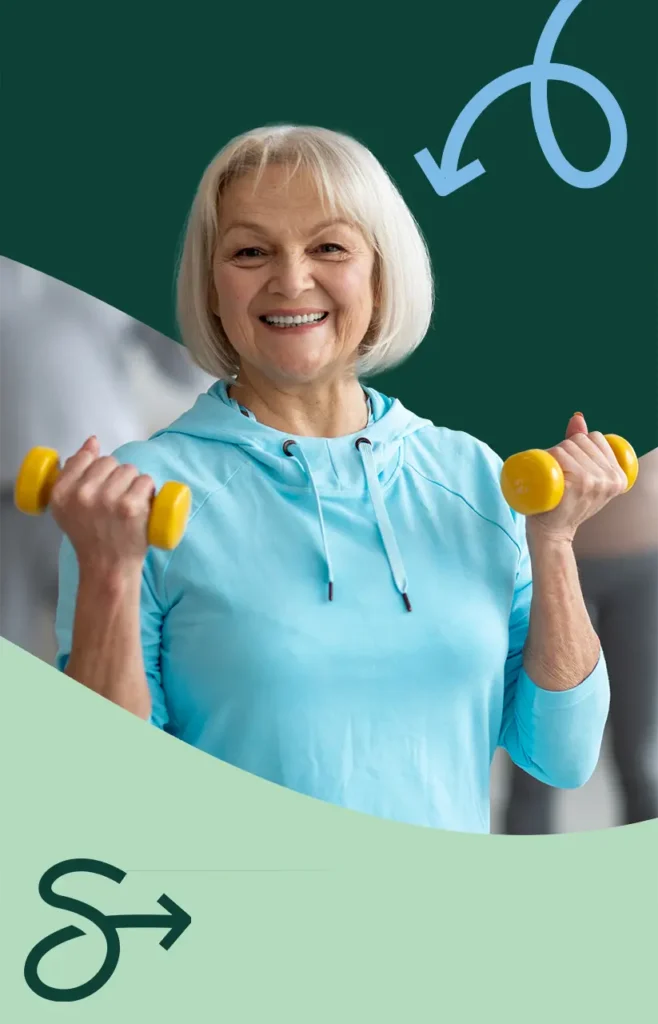Post-Surgery Physiotherapy in Solihull
Specialist post-surgery physiotherapy in Solihull
Recover strength, mobility and confidence after your operation with targeted, evidence-based rehabilitation. Our Solihull physiotherapists tailor your plan to your procedure and goals, guiding you safely through each stage of recovery.
Recover Faster. Move Better. Reduce Complications
Why Post-Surgery Physiotherapy Matters
The right post-surgery physiotherapy programme is essential for a smooth and successful recovery.
Our tailored rehabilitation plans help you restore movement, reduce pain and swelling, and rebuild strength and confidence.
Every treatment plan follows evidence-based principles and is carefully aligned with your surgeon’s post-operative protocol to ensure safe, effective progress from your first steps to full function.
- Reduce pain, swelling and stiffness with targeted therapy
- Restore range of motion and functional strength
- Re-train gait, balance and everyday activities
- Lower risk of compensations and long-term limitations
- Gain confidence and clarity at every stage of recovery

Conditions & Programmes We Treat
Post-Surgery Physiotherapy for All Major Operations
We tailor every rehabilitation plan to your individual operation, recovery timeline, and your surgeon’s specific guidance.
Whether you’re in the early stages of protection and mobility, or rebuilding strength and confidence later in recovery, our evidence-based programmes support you every step of the way.
Each plan is designed to help you regain function safely, reduce complications, and return to normal activities as quickly and comfortably as possible.
- Post-Hip Surgery Physiotherapy: Early mobility, hip ROM, gait re-education, progressive strengthening.
- Post-Knee Surgery Physiotherapy: Swelling control, knee flexion/extension, quads activation, stair training.
- Post-Ankle/Foot Surgery Physiotherapy: Controlled loading, balance/proprioception, return to walking.
- Post-Shoulder Surgery Physiotherapy: Conditioning programmes to enhance postural control and core stability.
- Post-Elbow Surgery Physiotherapy: Restore joint mobility, protect healing tendons, and rebuild upper-limb strength.
- Post-Hand Surgery Physiotherapy: Improve fine motor control, scar management, and grip strength for daily activities.
- Post-Neck Surgery Physiotherapy: Relieve stiffness, enhance neural mobility, and restore postural control safely.
- Post-Back Surgery Physiotherapy: Rebuild core stability, improve flexibility, and support long-term spinal health.

Real Clients, Real Results
EXCELLENTTrustindex verifies that the original source of the review is Google. Having recently been diagnosed with Parkinson's, Richard visited my home and I was delighted with the help he gave me with exercises - I feel better already and tomorrow plan to go to his class in Dorridge!Posted onTrustindex verifies that the original source of the review is Google. Richard is a highly competent, skilled physiotherapist. He has a pleasant easy going nature and can get the best out of people who use his serivices. Hazel is an 82 year old lady who has a condition called myositis. This complaint ia caused by the imuno system attacking the body's muscles severely weakening them. When Richard first met Hazel she was bed bound and could not sit unaided on the edge of the bed. After 5 months of exercises and encouragement by Richard she is now able to walk, with the aid of a zimmer frame, get out of bed unaided, get in and out of a car, climb down the step out of the house and wash and dress herself. Hazel is proof that Richard is an excellent choice for any elderly person who needs phisiotherapy. Hazel and her husband would both highly recommend Richard to anyone, but particulalrly the eldely, needing physiotherapy.Posted onTrustindex verifies that the original source of the review is Google. Stride Physiotherapy Solihull have helped me to recover following a period of illness with regular exercise support and advice.Posted onTrustindex verifies that the original source of the review is Google. When my daughter suggested that my husband and I should contact Richard for physiotherapy I was a little apprehensive. We are both 74 I have an arthritic knee and my husband has strength and stability issues following an operation. When we met Richard my worries were dispelled. He spent time listening and understanding us in order to provide appropriate exercises in his own encouraging but firm way to improve our conditions. I would heartily recommend him.Posted onTrustindex verifies that the original source of the review is Google. Richard has been helping my 85yo Mum with her mobility, she cannot sing his praises highly enough. He's also bee liaising with myself and my brother to keep us informed. Highly recommended.Posted onTrustindex verifies that the original source of the review is Google. Stride Physiotherapy has provided an excellent pathway for my recovery programme from a difficult femur fracture . The service is friendly but firm and also supported by new technology developed in-house. The support given is clearly based on a wealth of experience in the health and fitness sector.Posted onTrustindex verifies that the original source of the review is Google. Richard has achieved more than we'd ever hoped with our elderly parents. He is extremely knowledgeable and professional yet friendly. He has helped them develop their balance and strength and instilled confidence to the extent that mum and dad have gone from being almost house bound to being able to go out for walks independently. They really look forward to Richard's visits and love doing the exercises he suggests. We would genuinely recommend Richard.Posted onTrustindex verifies that the original source of the review is Google. Richard has provided excellent therapy for my elderly mother who is awaiting knee replacement surgery. Having been very immobile, Richard delivered 3 invaluable consultations resulting in her walking confidently with a frame, using the stairs and even being able to get out to the garden. This has not only provided a much needed improvement with her mobility but also helped ensure she will be better placed for post-operative recovery in due course. Would thoroughly recommend Richard for elderly patients.Posted onTrustindex verifies that the original source of the review is Google. Richard is very professional, knowledgeable and easy to talk to. The sessions are always productive. From day one he made me and my mum feel comfortable and took the time to understand what was going on with our injuries. The treatment Richard gives is clear, easy to follow and is actually working. I couldn’t be happier with the care I have received. If you’re looking for someone who knows their stuff and genuinely cares, I would highly recommend Richard. Really grateful for the help and support throughout my recovery.Posted onTrustindex verifies that the original source of the review is Google. Richard is the kindest person - who inspires you.
What to Expect from Your Rehab
A Personalised Plan from Day One to Full Function
Every recovery journey begins with a detailed assessment and progresses through a structured, phase-based plan. Our approach combines expert clinical care, guided exercise, and patient education to ensure a safe and effective return to daily activity.
- Initial Assessment: Pain, swelling, range of motion, strength, and gait/posture analysis, with review of surgical notes.
- Phase-Based Plan: Clear weekly goals and progression stages aligned with your surgeon’s recovery protocol.
- Manual Therapy & Modalities: Applied where appropriate, including joint and soft-tissue techniques and swelling management.
- Exercise Progressions: Gradual and structured advancement from range of motion to activation, strength, balance, function, and return to sport or work.
- Home Programme & Check-Ins: App-based exercise guidance with measurable milestones and regular physiotherapist reviews.
- Education: Advice on pacing, pain expectations, wound and scar care (as appropriate), and recognising red flags during recovery.
Evidence-Based Benefits
Clear Phases. Measurable Progress.
Recovery after surgery happens in clear, structured phases. Each stage focuses on restoring comfort, mobility, and independence — with progress monitored and adapted to your pace and goals.
Timelines vary depending on your surgery, overall health, and mobility level, but every plan is fully individualised.
Phase 1: Protect & Settle (Week 0–2)
Focus on pain and swelling control, safe movement around your home, and gentle range-of-motion exercises. We’ll also guide you on wound care and positioning to protect your surgical site.
Phase 2: Restore Motion (Weeks 2–6)
Gradually reintroduce movement with assisted and active exercises to restore flexibility and confidence. This phase supports circulation, joint mobility, and smoother walking patterns.
Phase 3: Build Strength (Weeks 6–12)
Target muscle strength, balance, and coordination using low-impact, functional exercises. The focus is on improving daily movement such as standing, walking, and climbing stairs safely.
Phase 4: Return to Activity (12+ Weeks)
Restore full independence through task-specific training. We help you regain confidence for everyday activities — from gardening and shopping to walking longer distances or gentle exercise classes.
Timelines are a general guide — every recovery plan is personalised to your individual surgery and mobility goals.
Schedule an appointment
A Chartered Physiotherapist visits you at home
Feel better about yourself
Post-Surgery Physiotherapy FAQs
When should I start post-surgery physiotherapy?
We usually begin within the timeframe your surgeon recommends—often in the first 1–2 weeks for many procedures, sometimes earlier for gentle range-of-motion. Starting promptly helps control pain and swelling, protects the surgical site, and prevents stiffness.
How often will I need sessions?
Frequency depends on your surgery and stage of recovery. As a guide, weekly sessions early on (first 4–6 weeks) are common, tapering to fortnightly as you progress and your home programme ramps up.
Do I need a referral from my consultant or GP?
No—self-referrals are welcome. With your consent, we will liaise with your consultant to align rehabilitation with your surgical protocol and any precautions.
What will we do in the first appointment?
We review your surgery, current symptoms and goals, assess pain, swelling, movement and function, and then start a safe, tailored plan. You’ll leave with a clear home programme and advice for pain and swelling control.
How long does recovery take?
Timelines vary by procedure and individual factors. As a broad guide: many patients see meaningful functional gains in 6–12 weeks, with full return to higher-level activity taking several months. We set realistic milestones and track progress together.
Where can I read general guidance about recovery after surgery?
The NHS has useful information on preparing for and recovering from surgery: NHS: Preparing for surgery.
